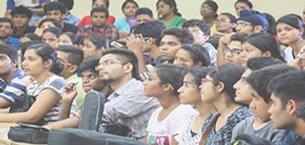Masters in Biotechnology in Australia is a 1.5 to 2-year postgraduate program offered by more than 40 universities. The program is available to students having pursued a bachelor’s in Biotechnology or a relevant stream from a recognized university. Students require a GRE score of 160 in verbal and 164 in quantitative reasoning for admission to MS Biotechnology in Australia.
Explore: Top Biotechnology Universities in Australia
The average annual tuition fee of Masters in Biotechnology in Australia ranges from AUD 8,820 to 49,350 (INR 4.87 to 27.27 lakhs). Students with financial need can fund their education through scholarships providing up to 50% fee waiver. Masters in Biotechnology in Australia also offers an appreciable return on investment. Graduates earn an average annual salary of AUD 83,800 or INR 46.7 lakhs per annum.
Check: Jobs in Australia for International students
Masters in Biotechnology in Australia: Highlights
| Courses Available | Masters of Biotechnology | MS in Biotechnology | Master of Medical Biotechnology | Master of Biotechnology and Bioinformatics |
| Course Type | Full-time |
| Program Duration | 1-2 years |
| Degree Requirement | Bachelor’s degree in Biotechnology or equivalent from a recognized university |
| GPA | 5.0 out of 7.0 (65-74%) |
| English Proficiency Requirements | IELTS: 6.5 (6 in each band) or TOEFL IBT: 85 overall |
| Entrance Exam | GRE Score: 160 in Verbal and 164 in Quant |
| Average Annual Tuition Fees | AUD 8,820 to 49,350 (INR 4.87 to 27.27 lakhs) |
| Average Annual Salary Range | AUD 50,300 to 83,800 (INR 28 to 46.7 Lakhs) |
Top Universities for Masters in Biotechnology in Australia
Masters in Biotechnology in Australia is offered by more than 40 universities. Out of these, many universities are globally ranked by some of the top ranking agencies. The top 10 institutions offering Masters in Biotechnology in Australia are given below:
| University | Program | Duration | Application Deadlines and Important Dates | Tuition Fee (AUD) |
|---|---|---|---|---|
| University of Queensland | Master of Biotechnology | 1 year (full time) | 1.5 years (full time) | 2 years (full time) | May 31, 2023 | 43,000 |
| The University of Technology, Sydney | Master of Medical Biotechnology | 1.5 years (full- time) | 2 years (part-time) | November 30, 2022 (closed) | 33,200 |
| The University of Melbourne | Master of Biotechnology | 2 years (full time) | April 30, 2023 (mid-year intake) | October 30, 2023 (start-year intake) | 50,500 |
| Swinburne University | MS in Biotechnology | 2 years | June 14, 2023 | 39,600 |
| Australian National University | Master of Biotechnology | 2 years (full time) | April 15, 2023 | 49,350 |
| The University of Western Australia | Master of Biotechnology | 1.5 to 2 years (full time) | November 30, 2022 (Closed) | 43,200 |
| RMIT University | Master of Biotechnology | 2 years (full time) | Semester 2 Application Opens: May 1, 2023 | 38,400 |
| Macquarie University | Master of Biotechnology | 1 year (full time) | 2 years (full time) | July 10, 2023 | 42,000 |
| Griffith University | Master of Biotechnology | 2 years (full time) | June 3, 2023 | 36,500 |
| La Trobe University | Master of Biotechnology and Bioinformatics | 2 years (full time) | January 17, 2023 (Closed) | 39,000 |
Why Study Masters in Biotechnology in Australia?
- Australia is one of the top countries for Biotechnology programs, given the placement opportunities, degree program options, and accommodation facilities.
- Masters in Biotechnology in Australia opens up the doorway to Ph.D. in Biotechnology in Australia.
- Masters in Biotechnology in Australia comes up with numerous specialisation options such as Agricultural Biotechnology, Animal Agricultural Biotechnology, Plant Agricultural Biotechnology, etc.
- Between 2018 and 2023, the market size of Biotechnology industry in Australia has increased by 4% annually, which is a faster rate than the overall Thematic Reports sector.
- Graduates can expect to earn an annual average salary ranging from AUD 50,300 to 83,800, equivalent to INR 28 to 46.7 lakhs.
The average salaries of Biotechnologists in Australia across some of the popular cities are provided here:

Masters in Biotechnology in Australia: Specializations and Subjects
MS in Biotechnology in Australia is offered as a variety of specialisations with a plethora of subject comparisons. In the same regard, here are the disciplines and subjects for a Master in Biotechnology in Australia:
Specialisations:
- Agricultural Biotechnology
- Animal Agricultural Biotechnology
- Plant Agricultural Biotechnology
- Medical Biotechnology
- Synthetic Biology and Industrial Biotechnology
Subjects:
- Bio-Business Management
- Bioinformatics
- Practical Biotechnology
- Protein Chemistry
- Proteomics and Genomics
- Scientific Communication Skills
- Skills in Science
- Techniques in Biotechnology
Interested candidates must note that subjects for Masters in Biotechnology in Australia are subjected to change with the university.
Masters in Biotechnology in Australia Admission
Individuals can apply for Masters in Biotechnology in Australia in two intake sessions: February and July. A candidate unable to enter through the first intake can apply for the next one without waiting for a year.
Masters in Biotechnology in Australia: Eligibility Criteria
Candidates have to fulfil a certain set of requirements to apply for a Master in Biotechnology in Australia. The degree being the same, all the entry requirements can be summed up and presented as:
- Degree Qualification: Bachelor’s degree in Biotechnology, Bioinformatics, Biomedical Sciences, or related streams with a minimum aggregate of 50%.
- Standardised Test Scores: Although standardised test scores are not mandatory, submitting a minimum GRE score of 305 (160 in Verbal and 164 in Quantitative Reasoning) is recommended.
- Proof of English Proficiency: Candidates having a minimum IELTS score of 6.5 with at least 6 in each band are accepted by most universities.
Masters in Biotechnology in Australia: Admission Requirement
The eligibility criteria for Masters in Biotechnology in Australia varies across colleges. The following table demonstrates the admission requirements of Masters in Biotechnology in Australia:
| University | Eligibility Criteria | Minimum IELTS Score |
|---|---|---|
| University of Queensland | Bachelor’s degree in Biotechnology, Bioinformatics, Biomedical Sciences, or other streams with a minimum GPA of 5.0 out of 7.0 (65-74%) | 6.5 (with no less than 6.0 in each band) |
| The University of Technology, Sydney | Bachelor’s degree in Biotechnology, MIcrobiology, Human Biology, genetics, etc. from a recognized university | 6.5 (with no less than 6.0 in each band) |
| University of Melbourne | Bachelor’s degree in Biotechnology or a relevant stream with a minimum aggregate of 65% from a recognized university | 6.5 (with no less than 6.0 in each band) |
| Swinburne University | Bachelor’s degree in biological or medical sciences with an aggregate of at least 60% from a recognized university | 6.5 (with no less than 6.0 in each band) |
| Australian National University | Bachelor’s degree in Biotechnology or relevant streams with a minimum GPA of 5.0 out of 7.0 (65-74%) | 6.5 (with no less than 6.0 in each band) |
| University of Western Australia | Bachelor of Science or equivalent degree with a minimum aggregate of 50% from a recognized university | 6.5 (with no less than 6.0 in each band) |
| RMIT University | Bachelor’s degree in Biotechnology/ Biological Sciences/ Medicine/ Chemical Engineering or equivalent with a minimum GPA of 2.0 out of 4.0 (73-76%) from a recognized university | 6.5 (with no less than 6.0 in each band) |
| Macquarie University | AQF level 7 Bachelor’s degree in Biotechnology or equivalent with at least 65% aggregate | 6.5 (with no less than 6.0 in each band) |
| Griffith University | Bachelor’s degree in Biotechnology or relevant stream with a minimum GPA of 4.5 from a recognized university | 6.5 (with no less than 6.0 in each band) |
| La Trobe University | Australian Bachelor’s degree or international equivalent with at least years of studying Biology and 2 semesters of Biochemistry, Microbiology, Immunology, or Biotechnology with a weighted average of 60% | 6.5 (with no less than 6.0 in each band) |
After checking the eligibility criteria for Masters in Biotechnology in Australia and shortlisting a university, candidates must make sure they possess the following documents:
- Official academic transcripts or certified copies of them
- A 500-word Statement of Purpose (SOP), elaborating the applicant’s perception of the course and future plans, is required at the time of application
- 1 professional LOR and 2-3 academic LOR are also essential
- Passport size photographs and digital signature of the applicant
- A valid passport
- Australian student visa
- An updated resume containing precise information of the candidate, his/her previous jobs, course enrolled, prizes won, certificates, etc. is appreciable
Masters in Biotechnology in Australia Fees
Students can choose the universities for Masters in Biotechnology in Australia depending on their financial stability. The annual tuition fees at some of the popular universities in Australia offering Masters in Biotechnology are as follows:

| University | Annual Tuition Fees (AUD) | Equivalent Fees (INR) |
|---|---|---|
| University of Queensland | 43,000 | 23.79 Lakhs |
| The University of Technology, Sydney | 33,200 | 18.37 Lakhs |
| University of Melbourne | 50,500 | 27.73 Lakhs |
| Swinburne University | 39,600 | 21.88 Lakhs |
| Australian National University | 49,350 | 27.27 Lakhs |
| The University of Western Australia | 43,200 | 4.87 Lakhs |
| RMIT University | 38,400 | 21.22 Lakhs |
| Macquarie University | 42,000 | 23.21 Lakhs |
| Griffith University | 36,500 | 20.17 Lakhs |
| La Trobe University | 39,000 | 21.56 Lakhs |
Cost of Living in Australia
After assessing the cost of living in Australia, international candidates can plan their stay in the country and spend money wisely. A breakdown of the average cost of living in Australia for an international student is provided in the following table:
| Expense Type | Cost Per Month (AUD) | Monthly Cost Equivalent (INR) |
|---|---|---|
| Shared Rental | 340 to 860 | 18,000 to 45,800 |
| On-campus Accommodation | 360 to 1120 | 18,000 to 59,500 |
| Groceries | 320 to 1120 | 17,000 to 59,500 |
| Gas and Electricity | 140 to 560 | 7,400 to 29,700 |
| Phone and Internet | 80 to 220 | 4,245 to 11,700 |
| Public Transport | 75 to 220 | 4,000 to 11,700 |
| Entertainment | 80 to 150 | 4,250 to 8,000 |

Masters in Biotechnology in Australia Scholarships
Individuals with academic excellence or extra-curricular efficiency can fund their higher education in Australia with a variety of scholarships. Some of the popular scholarships for international students pursuing Masters in Biotechnology in Australia are as follows:
| Scholarship | Eligibility | Award |
|---|---|---|
| International Scholarship in Conservation Biology | International candidates enrolled at University of Queensland in a UG/PG program | Up to 10,000 AUD |
| George Swinburne Postgraduate STEM Scholarship | International candidates enrolled at Swinburne University in a STEM PG program | 30% off tuition fee |
| ANU Chancellor’s International Scholarship | International candidates enrolled at ANU in a UG/PG program | 25-50% tuition fee reduction |
| Faculty of Science and Engineering Women in STEM Scholarship | International women enrolled at Macquarie University in a STEM PG/UG program | 5,000 AUD |
| Early Bird Acceptance Grant | International candidates enrolled at La Trobe University in a UG/PG program | 5% waiver of the first-year tuition fee |
| La Trobe India Scholarship | International candidates enrolled at La Trobe University in a UG/PG program | 25% fee reduction |
| Australia Awards Scholarships | International students enrolled in a UG/PG program at The University | Various |
| UTS Grant for Masters by Coursework Students | International students enrolled in a Masters coursework at The University of Technology, Sydney | 3,000 AUD towards the first session tuition fees |
Read More: Part time Jobs in Australia
Masters in Biotechnology in Australia Placements
Graduates completing Masters in Biotechnology in Australia can work as a Quality Assurance Manager, Account Manager, Research Scientist and various other professionals. Graduates typically earn an annual average salary ranging from AUD 50,300 to 83,800 (INR 28 to 46.7 lakhs). The average salary after Masters in Biotechnology in Australia according to the profession of the graduates are provided in the following table:

| Jobs | Average Salary (AUD) | Average Salary (INR) |
|---|---|---|
| Clinical Research Coordinator | 73,000 | 40 lakhs |
| Research Scientist | 65,000 | 35 lakhs |
| Research Laboratory Technician | 62,000 | 34 lakhs |
| Research Associate, Biotechnology | 73,000 | 40 lakhs |
| Quality Assurance Manager | 95,000 | 52 lakhs |
| Quality Assurance Coordinator | 75,000 | 41 lakhs |
Know More: Jobs After MS in Australia
Masters in Biotechnology in Australia Return on Investment
Universities in Australia offering MS in Biotechnology in Australia ensures high return on investment. The following table shows a comparison between the tuition fees and average salary of graduates. This indicates the return on investment for Masters in Biotechnology in Australia.

| University | Annual Tuition Fees (AUD) | Graduate Salary (AUD) |
|---|---|---|
| University of Queensland | 43,000 | 72,000 |
| The University of Technology, Sydney | 33,200 | 73,000 |
| University of Melbourne | 50,500 | 74,000 |
| Swinburne University | 39,600 | 66,000 |
| RMIT University | 38,400 | 66,000 |
| Macquarie University | 42,000 | 70,000 |
| Griffith University | 36,500 | 67,000 |
| La Trobe University | 39,000 | 66,000 |
The above-mentioned graduate salaries are estimated based on several factors. These are not precise or guaranteed numbers to rely on.
Masters in Biotechnology in Australia v/s Masters in Biotechnology in Canada
Observing the entry requirements, language requirements and tuition fees of various institutions is a tedious and time-consuming task. The following table compares the particulars of the top 3 universities that offer Masters in Biotechnology in Australia:
| Parameter | Masters in Biotechnology in Australia | Masters in Biotechnology in Canada |
|---|---|---|
| Degree Name | Masters of Biotechnology | MS in Biotechnology | Master of Medical Biotechnology | Master of Biotechnology and Bioinformatics | MS in Biotechnology | Master of Biotechnology | Graduate/Advanced Diploma in Biotechnology |
| Course Duration | 1-2 years | 2 years |
| Program Types | Part-Time, Full-Time | Part-Time, Full-Time |
| Admission requirements | Bachelor’s degree in Biotechnology or equivalent from a recognized university | BSc or BSc (hons) in Biological Sciences or related fields | 2-3 LORs | Statement of Purpose | Personal Statement | Updated Resume/CV | Official Transcripts |
| GPA | 5.0 out of 7.0 (65-74%) | Minimum GPA of 3.0 on a 4.0 scale (83-86%) |
| Language Proficiency | IELTS: 6.5 (6 in each band) or TOEFL IBT: 85 overall | IELTS: 6.5 | TOEFL: 93 |
| Standardized Test Scores | GRE Score: 160 in Verbal and 164 in Quant | Optional |
| Monthly cost of living | 2,326 AUD (1.28 lakhs INR) | 1,987 CAD (1.19 lakhs INR) |
| Average Tuition Fee | AUD 8,820 to 49,350 (INR 4.87 to 27.27 lakhs) | 11,389-55,976 CAD (6.88-33.86 lakhs INR) |
| Average Salary | AUD 50,300 to 83,800 (INR 28 to 46.7 Lakhs) | 60,000 CAD (36.30 lakhs) |
Masters in Biotechnology in Australia is placement oriented technical program. Australia is one of the most popular countries for international studies and completing Masters in Biotechnology there helps you to build your career not only in Biotechnology but also in other related fields such scientific writing, health informatics, etc.
FAQs
Ques. Is Masters in Biotechnology in Australia worth it?
Ans. Masters in Biotechnology in Australia is a great choice for candidates who wish to excel in the stream of bioinformatics and bioinformation. Given that you are studying for a Masters in Biotechnology in Australia, the chances of getting employed at well known and highly established companies increases.
Ques. Is IELTS score required for MS in Biotechnology in Australia?
Ans. Candidates hailing from non-English speaking countries, i.e., their native language is not English, must submit IELTS or TOEFL scores. An IELTS score of 6.5 with 6.0 in each section is accepted across various universities. These countries include India, Bangladesh, Nepal, Bhutan, etc.
Ques. What job can I get after pursuing a Masters in Biotechnology in Australia?
Ans. After completing a Masters in Biotechnology in Australia, one can expect to become a Quality Assurance Manager, Quality Assurance Specialist, or even a Research Scientist in Biotechnology.
Ques. What are the top universities for a Masters in Biotechnology in Australia?
Ans. There are several top universities that offer a high-quality Masters in Biotechnology program in Australia. Some of the top universities are:
- The University of Melbourne
- The University of Technology, Sydney
- The University of New South Wales
- The Queensland University
- RMIT University
Ques. What are the tuition fees for a Master in Biotechnology in Australia?
Ans. The average cost of studying a Masters in Biotechnology in Australia ranges from AUD 8,820 to 49,350. For Indian students, this is equivalent to INR 4.87 to 27.27 lakhs.
























Comments